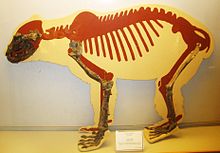Ursus minimus
Appearance
| Ursus minimus Temporal range:
| |
|---|---|

| |
| Scientific classification | |
| Domain: | Eukaryota |
| Kingdom: | Animalia |
| Phylum: | Chordata |
| Class: | Mammalia |
| Order: | Carnivora |
| Family: | Ursidae |
| Genus: | Ursus |
| Species: | †U. minimus
|
| Binomial name | |
| †Ursus minimus Devèze & Bouillet, 1827
| |
| Synonyms | |
| |
Ursus minimus (the Auvergne bear) is an extinct species of bear, endemic to Europe during the Pliocene and Pleistocene, living from 5.3 to 1.8 Mya, existing for about 3.5 million years.
U. minimus appears to have given rise to Ursus etruscus.[1] The range of U. minimus was continental Europe, as far east as the Black Sea in Russia and as far south as Italy.
The skeleton of U. minimus was very similar to that of the larger Asian black bear. With the exception of the age of the bones, it is often difficult to distinguish the remains of U. minimus from those of modern Asian black bears.[2]
Fossil distribution
[edit]Sites and specimen ages:
- Kossiakino 1, Stavropol'skaya, Russian Federation ~5.3—3.4 Mya.
- Kuchurgan gravel site, Ukraine ~4.9—4.2 Mya.
- Osztramos locality 7, Caves of Aggtelek Karst and Slovak Karst, Borsod-Abaúj-Zemplén County, Hungary ~3.4—1.8 Mya.
- Seneze (Domeyrat) site, France ~3.4—1.8 Mya.
- Meleto site, Tuscany, Italy ~3.2—2.5 Mya.[3]
References
[edit]- ^ Wagner, J. (2010). "Pliocene to early Middle Pleistocene ursine bears in Europe: a taxonomic overview". Journal of the National Museum (Prague), Natural History Series. 179 (20): 197–215.
- ^ Search for the Golden Moon Bear: Science and Adventure in Pursuit of a New Species by Sy Montgomery published by Chelsea Green Publishing, 2009
- ^ Paleobiology Database: Meleto collection
